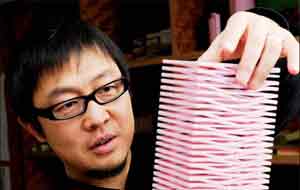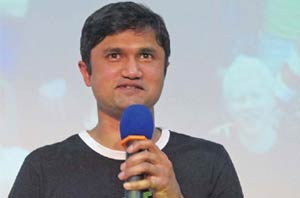Random access
Updated: 2011-09-16 08:40
By Andrew Moody (China Daily)
|
|||||||||
Rudiger Wischenbart, who runs his own publishing consulting business in Vienna and is about to release a paper on international digital reading trends at next month's Frankfurt Book Fair, says such reading behavior makes it very difficult to understand the market in China.
|
 Publishing consultant Rudiger Wischenbart. |
"What people are reading here is serial stories, not really novels, so it is also blurring the distinction between what is a series of articles in a magazine and what is a novel."
"I have a friend who read the latest book by the best-selling author Ken Follett on his iPhone but that is very unusual in the West. People in China like to do this all the time, however."
Zhong Xiong, brand manager of the digital reading base of China Telecom, one of China's leading mobile phone companies, says the reason why the Chinese read so much on their phones is that many don't have access to a PC and cannot afford a specialist e-reading device.
"One of the biggest markets is migrant workers who like to spend their spare time reading novels on their phones. Some novels, particularly those in historical fiction, have had tens of million of readers."
Zhong says that beyond paying for their mobile phone, these readers are not paying for their reading experience.
"There have been a number of Chinese companies which have tried to reproduce the Kindle model in China but they have not been successful because people copy the book immediately and that is why it doesn't work in China."
Wischenbart says the current digital publishing market in China does provide an interesting dynamic, citing websites such as qidian which encourage people to self publish their works.
"You can start to write a novel in Chinese on this site. Someone will read it and tell a friend and you then have two readers. If you are very good by the end of the week you might have 100,000 readers," he says.
"If eventually you have a huge community of readers then a normal publishing company might buy the rights and print a paper version. It is a very different model to anything in the West."
A major part of the digital publishing market internationally is not fiction or trade books for a general audience but academic journals and scientific publications.
Academics prefer to do a lot of their research online and so are very keen to take advantage of digitized material.
Taylor & Francis Group, based at Milton Park, near Oxford in England, one of the world's largest academic publishers, was founded in 1798 and is steeped in tradition. It has, nonetheless, embraced new technology and has some 31,000 titles available as e-books.
Barry D. Clarke, managing director of Taylor & Francis Asia Pacific, based in Singapore, received a number of orders for e-books at the recent Beijing Book Fair, where the company had a stand.
"We are very keen to develop digital sales here and we are getting more and more interest in e-books," he says.
"What we find here with libraries is they still prefer to have the physical product (printed book) to prove there has been a transaction. Our sales model allows them access online with the print subscription. We are not trying to force people to go online. If they still want print, that is fine."









